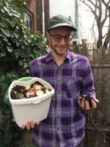Rod Muir Presentation on Ottawa’s Green Bin Program
httpv://www.youtube.com/watch?v=HwCCf4E8nqU One of my favorite trash talkers named Ed Barr recommended to me recently to check out this guy Rod Muir in Canada, saying I'd like his composting videos... not surprisingly, he was right! He makes some really simple points that I've always neglected to bring forth in my mind- when you bought stuff, you bought it individually. When it's longer usable, separate it again! He also nails all the benefits perfectly: -less going to the landfill -less odor (food causes most of the landfill smell!) -carbon dioxide instead of methane (yes, methane is a lot worse than CO2) -you're producing your own soil -use less pesticides and fertilizer I also like that he mentions using a paper bag to line your bin instead of a biodegradable plastic bag... no…
